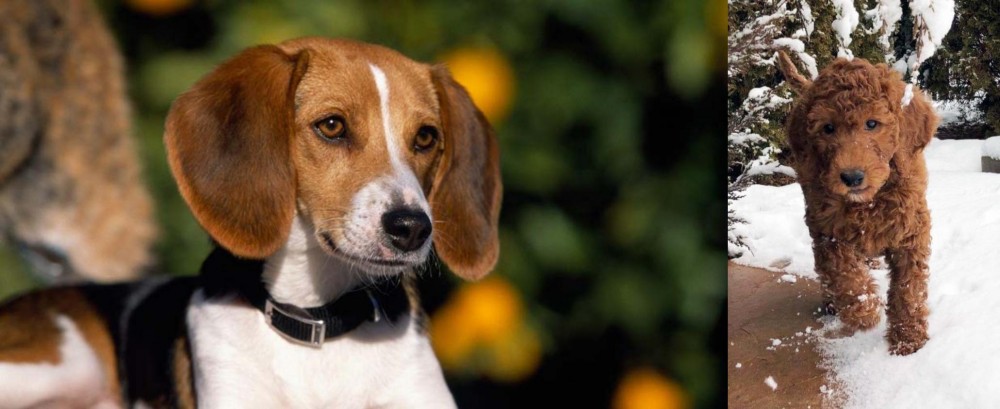 Petzlover
Petzlover Both American Foxhound and Irish Doodles are originated from United States. American Foxhound may grow 26 cm / 11 inches higher than Irish Doodles. Both American Foxhound and Irish Doodles are having almost same weight. Both American Foxhound and Irish Doodles has almost same life span. Both American Foxhound and Irish Doodles has same litter size. Both American Foxhound and Irish Doodles requires Low Maintenance.
Both American Foxhound and Irish Doodles are originated from United States. American Foxhound may grow 26 cm / 11 inches higher than Irish Doodles. Both American Foxhound and Irish Doodles are having almost same weight. Both American Foxhound and Irish Doodles has almost same life span. Both American Foxhound and Irish Doodles has same litter size. Both American Foxhound and Irish Doodles requires Low Maintenance.
 As a cousin of the English Foxhound, the American Foxhound is a scent hound and bred for hunting. Robert Brooke brought the first hunting dogs to the colonies in 1650. These dogs were the starting point for several American hound breeds including the American Foxhound.
As a cousin of the English Foxhound, the American Foxhound is a scent hound and bred for hunting. Robert Brooke brought the first hunting dogs to the colonies in 1650. These dogs were the starting point for several American hound breeds including the American Foxhound.
For almost 300 years the Brooke family owned and bred dogs from this bloodline.
At the same time that Brooke was hunting with and breeding his hounds, George Washington was given French Foxhounds. These were crossed with the Brooke’s dogs to create the American Foxhound. This breed is said to have been originally bred in Virginia and Maryland.
They are the state dog of Virginia. After Red Foxes were imported or migrated, Irish Foxhounds were brought to American and added into the line, increasing the stamina and speed that today’s dog’s still display.
The American Foxhound was recognized by the American Kennel Club in 1886. Today’s American Foxhound presents in many different lines but are all considered the same breed even though some ay look very different. These strains include the Trigg, Walker, Penn-Marydel, Goodman, July and Calhoun.
 Known also as the Irish Doodle Setter or the Irish Setterdoodle, the Irish Doodle is a crossbreed – a mix of Irish Setter and Poodle.
Known also as the Irish Doodle Setter or the Irish Setterdoodle, the Irish Doodle is a crossbreed – a mix of Irish Setter and Poodle.
This designer crossbreed comes from the United States. There isn't much of a history with the Irish Doodle, though both breeds used to create this dog breed have their own long histories.
Because the Irish Doodle is a hybrid breed, it isn’t recognized by the American Kennel Club. It is however recognized by the American Canine Hybrid Club.
 Given the variety of bloodlines and strains mentioned above, there can be many differences in the American Foxhounds. Because of this most American Foxhounds bred to show are Walkers as they most closely fit the AKC Breed Standard.
Given the variety of bloodlines and strains mentioned above, there can be many differences in the American Foxhounds. Because of this most American Foxhounds bred to show are Walkers as they most closely fit the AKC Breed Standard.
In general, the American Foxhound has long, straight legs and is taller than the English Foxhound. They have a narrow chest and domed skull with a long muzzle.
They have low, wide set eyes that should be dark – brown or hazel, never blue. They have feet like a fox and laid-back shoulders with a curved tail. Athletic and muscled, the American Foxhound is bred to run. They are one of the rarest breeds in the United States.
 The Irish Doodle is a medium sized dog, standing at roughly 33cm to 38cm and weighing roughly 18kg to 31kg.
The Irish Doodle is a medium sized dog, standing at roughly 33cm to 38cm and weighing roughly 18kg to 31kg.
Pet owners appreciate that a dog like this is considered to be hypoallergenic and this attractive aspect of this dog comes from the Poodle side. The Irish Doodle's coat is long, soft and fairly wavy with apricot being the most common coat color but other colors include white, cream, brown and black. The head and muzzle is longish, the eyes brown, the ears floppy and the tail long.
The Poodle and the Irish Setter combine to ensure that the Irish Doodle is an intelligent dog and that he has an amicable disposition so that he is good with kids and pets in the home.
He has a host of excellent characteristics that make him a superb family pet and these are friendliness, intelligence, devotion and loyalty. He is easy to train and training and socialization will make him obedient so that he responds well to simple instructions such as come, stay, lie down, sit etc.
 With a reputation as a docile, sweet dog, the American Foxhound is great with kids and animals. They are gentle and often very shy with strangers. They are strong willed and stubborn especially when training them, so they are not a good first dog. They need an owner who has handled dogs before and knows how to be the pack leader without being angry or mean.
With a reputation as a docile, sweet dog, the American Foxhound is great with kids and animals. They are gentle and often very shy with strangers. They are strong willed and stubborn especially when training them, so they are not a good first dog. They need an owner who has handled dogs before and knows how to be the pack leader without being angry or mean.
The American Foxhound is a scent hound and once he is on the scent it is close to impossible to distract him from it. They have a tendency to ignore commands when they are in this state. A strong owner/leader is needed for this reason. Don’t let him off leash in an unfenced area.
 The Irish Doodle is guaranteed to make you a great pet. Every dog becomes better when they have been trained and socialized as they require having interactions with other dogs and people to know how to behave around them later on.
The Irish Doodle is guaranteed to make you a great pet. Every dog becomes better when they have been trained and socialized as they require having interactions with other dogs and people to know how to behave around them later on.
The Irish Doodle is a playful, active, attractive, loyal, fun loving pet who will learn easily.
The most important thing to remember with your Irish Doodle is to get involved in his life. He didn’t ask to come to you, but if you do your part and treat him like a much loved family member, you’ll soon see that your life isn’t complete without a wonderful 4-legged friend like the Irish Doodle.
 The American Foxhound, like most hunting dogs does not carry a lot of genetic disorders. But they can easily become overweight and this can cause major problems. Dysplasia of any type had been mostly unknown in this breed, but due to obesity it is cropping up on occasion. Breeders have not, and do not usually screed for any genetic diseases.
The American Foxhound, like most hunting dogs does not carry a lot of genetic disorders. But they can easily become overweight and this can cause major problems. Dysplasia of any type had been mostly unknown in this breed, but due to obesity it is cropping up on occasion. Breeders have not, and do not usually screed for any genetic diseases.
The most devastating health issue the American Foxhound faces is thrombocytopathy. We will go into more detail on this in the Care for Pet section. This is a disease of the blood system, namely the platelets.
 Irish Doodles are a robust, resilient breed, and with good care they can live to be 11, 12, 13 or 14 years. Nonetheless you need to know about the more common dog illnesses that any dog can develop.
Irish Doodles are a robust, resilient breed, and with good care they can live to be 11, 12, 13 or 14 years. Nonetheless you need to know about the more common dog illnesses that any dog can develop.
These are hip dysplasia, eye problems, ear infections, bloat and Von Willebrand's Disease.You can improve your dog’s health by making sure he gets the very best food there is to eat, a warm, dry place to sleep and that he is treated with lots of love and care.
Von Willebrand's disease is an inherited bleeding disorder. The disorder comes about because of a deficiency of von Willebrand Factor. This is an adhesive glyco-protein in the blood which is necessary for platelet binding or clotting. The condition can lead to excessive bleeding after an injury because the blood can’t clot.
 Whether feeding a pup, or an adult American Foxhound, you need to be sure the food is high quality and that you don’t overfeed. The Foxhound is happy to eat as much as you give him. They like to eat. Make sure you measure and don’t free feed. Control what they are eating.
Whether feeding a pup, or an adult American Foxhound, you need to be sure the food is high quality and that you don’t overfeed. The Foxhound is happy to eat as much as you give him. They like to eat. Make sure you measure and don’t free feed. Control what they are eating.
For a puppy feed twice, a day – 2 to 3 cups of high quality puppy food. When he becomes an adult feed him once a day with 2 cups of adult food.
As mentioned previously, the American English Foxhound, like most of the hound breeds is a very healthy dog. They do not have many genetic health issues. They do have a risk for thrombocytopathy. This risk is slight, but all owners of American English Foxhounds should be aware of it.
This disease is a circulatory system disease with poorly or non-functioning platelets. Platelets are designed to assist in the control of bleeding and without functioning ones the dog can bleed excessively from just a minor cut or bleed internally from a minor injury. The disease can be treated but you have to notice it first. Depending on how severe the disease is, the treatment will vary. Some dogs will have to be given platelets.
This is a high energy breed that is very active and needs a lot of exercise. They are not good for the first-time owner as they are stubborn and hard to train. They need room to run and get frustrated and out of sorts if they don’t have it. They can live in the suburbs but only with a large fenced yard, an even larger dog park and regular walks. This dog needs a lot of exercise. The simplest thing to do is take him hunting.
 Even though the Irish Doodle's coat is long, this is a dog with just about no shedding, so a brush once a week will ensure his coat stays in tip-top condition. Some Irish Doodle owners like to take their pet to have the coat professionally trimmed.
Even though the Irish Doodle's coat is long, this is a dog with just about no shedding, so a brush once a week will ensure his coat stays in tip-top condition. Some Irish Doodle owners like to take their pet to have the coat professionally trimmed.
The Irish Doodle isn’t one of these dogs where you need to ensure a good dose of exercise every day. He doesn’t particularly need a lot of exercise, so include him in your daily walks and give him a ball game now and then to keep him happy and fit.
As a medium sized dog, your Irish Doodle will require a high quality diet that will ensure he is getting all the right minerals and vitamins he needs for his activities.
If you choose one of the wet or dry commercially manufactured foods, make sure it is one of the best quality ones free from fillers, colorants and preservatives. It is to your pet’s benefit to add in some homemade food to his kibble such as cooked chicken, brown rice, pasta and vegetables.
Raw meat is expensive, but if you can, give him some raw meat occasionally too as this promotes bright eyes, a wet nose and a healthy skin and fur.
Fresh, cool water must be provided every day non-stop.